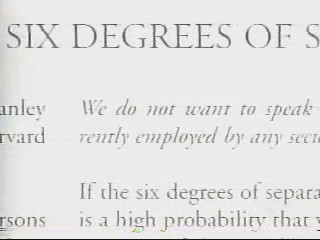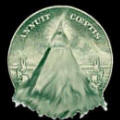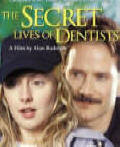RELATIONSHIP SPACE: Meet Your Network Neighbors
When we talk about distance, we almost always mean the space between objects or locations in the physical world. And for good reason: Most of the time, that's the sort of distance that makes sense. But after a century-long revolution in communications and transportation, physical space can be limiting or even misleading. Sociologists have long thought in terms of social space, the gap between individuals' wealth, education, ethnicity, or religion. More recently, however, social scientists and mathematicians have begun to examine another kind of distance, one increasingly important to our understanding of the world: network space.
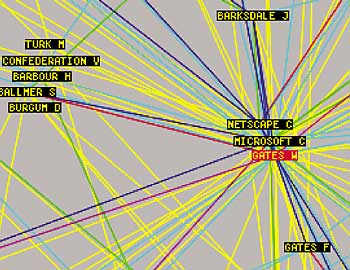 namebase.org |
A fascinating (and deceptively simple) example of network space is the small-world phenomenon, the idea that anyone on the planet can be connected to anyone else through just six degrees of separation. Although the notion had been floating around in popular culture for much of the 20th century, it was only tested in the late-'60s in an experiment conducted by social psychologist Stanley Milgram. Milgram gave letters to about 300 people in Boston and Omaha with instructions that the envelopes ultimately reach a single "target," a Boston stockbroker. The letters could be sent only to a personal friend of the current holder, who then received the same instructions. To the surprise of many, more than 60 of the letters reached their goal, changing hands, on average, only six times. Milgram's conclusion was that people who seem very distant in physical or social space may actually be closer than we imagine.
To account for this, we need to start thinking of individuals as nodes embedded in a complex web of social, economic, and institutional ties. In network space, two nodes can be closely connected regardless of their physical or social proximity. Physical and social influences don't go away, of course - often we know people because they live near us or share important characteristics such as education or profession - but the relationship of these factors with network space has remained a mystery for decades. Milgram, for example, was never able to explain why his experiment worked. Network data is difficult to collect, and analysis of complex networks is nearly impossible without powerful computers.
In the past five years, we've begun to understand how network space plays out both within and beyond the social world. The small-world phenomenon, it turns out, also shows up among power grids, neural networks, biochemical reactions, interlocking corporate boards of directors, collaborative networks of scientists, and even movie stars. Which is why Kevin Bacon appears to be the center of the cinematic universe. (It's just happenstance - any Hollywood actor would work just as well.)
In terms of our perception of the world, though, six degrees from someone is still a long way. We care a great deal about our friends (one degree), a bit about friends of friends we haven't met (two degrees). But a friend of a friend of a friend? Someone three degrees away is, for all practical purposes, a stranger, no more relevant to us than someone off the street.
But what happens to them can matter a lot. The explosion of HIV into a global pandemic, for example, was driven in part by the widely held perception that it was confined to gay men and intravenous drug users. If you didn't know anyone "like that," you didn't have anything to worry about. But it turns out that what happens beyond our limited network horizon can still hurt us. Or help us: We can't just call up a friend of a friend of a friend and request a job, but we can ask that person for help by making the right connections. In fact, we do this all the time, tracking down people by email, over the phone, or at cocktail parties by "networking."
Now that we're starting to understand network space, the implications of it are vast. Whether we're considering contagious diseases, cultural fads, or trends in the stock market, we need to start thinking in terms of networks. Sometimes they help us, and sometimes they hurt us - being connected can be good or bad. But either way, networks are always there. And when not just you but anyone can be connected to anyone else on earth in just six steps, what goes around comes around - faster than you think.
Wired magazine Issue 11.06 June 2003 Duncan Watts, the author of Six Degrees: The Science of a Connected Age, is associate professor of sociology at Columbia University and an external faculty member of the Santa Fe Institute.



.jpg)

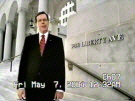

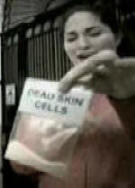





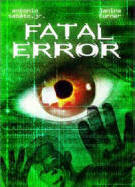
.jpg)





